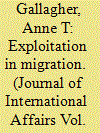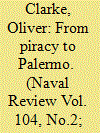|
|
|
Sort Order |
|
|
|
Items / Page
|
|
|
|
|
|
|
| Srl | Item |
| 1 |
ID:
181647


|
|
|
|
|
| Summary/Abstract |
Border walls are often seen as preferable options to improve security by providing strong barriers against the movement of people. Although these barriers are never absolute and remain porous, they are still appealing, which raises the question about who benefits when border walls are introduced. This article questions whether and for whom border walls work by focusing on the new Turkish-Syrian border wall in Hatay. Through an ethnographic investigation of border politics and the effects of increasing surveillance on residents of the border, it examines the socio-economic and political impact of the wall on local life. Second, it shows how the wall has led to a significant increase in migrant smuggling, which indicates improvements in security in one policy area may lead to a worsening situation in others. It concludes that the wall reinforces the state’s claim of sovereignty but fails to be an effective security measure for border residents or refugees.
|
|
|
|
|
|
|
|
|
|
|
|
|
|
|
|
| 2 |
ID:
138410


|
|
|
|
|
| Summary/Abstract |
For the millions of people who want or need to move, migration has become progressively more expensive and perilous. Legal access to preferred destinations is now an option only for the privileged few. The rest are forced into the arms of those able to help them circumvent ever-increasing controls and deterrents. Migrant smuggling, the business of moving people across borders for profit, is a sordid and dangerous enterprise, often placing lives and well-being at serious risk. And the dangers do not end there. Many of the world’s migrants find themselves deeply in debt to recruitment agencies, brokers, and sometimes their own employers before they even start work. In too many cases, these asymmetrical arrangements reach the level of human trafficking: Victims are tricked or coerced into situations of exploitation from which they cannot escape. This article argues that such practices, while unacceptable, are also inevitable. Without profound reforms to global migration regimes—and indeed to the organization of the global economy—there is likely no effective solution to migration-related exploitation. But important steps can be taken, even within the limits of current political constraints, to minimize vulnerability and harm. These include promoting political and legal acceptance of basic rights for all migrants, developing quality control systems for international labor recruitment, eliminating recruitment fees and sponsorship schemes, and co-opting civil society in an effort to increase transparency and accountability of governments and business activities.
|
|
|
|
|
|
|
|
|
|
|
|
|
|
|
|
| 3 |
ID:
146871


|
|
|
| 4 |
ID:
188531


|
|
|
|
|
| Summary/Abstract |
In the ongoing global ‘war on migration’, no character has been more vilified than the ‘human smuggler’. Images of unscrupulous men taking advantage of innocent people flood the media and political discourse. Morocco, with its strategic geopolitical position as a main gateway between Africa and Europe, is no exception in this regard. In this article, I examine how the smuggler has come centre stage in the borderwork around the Europe–Morocco frontier. The concept of borderwork has gained traction in recent scholarship as a way of describing the complicated and rapidly changing empirical complexity of the creation and control of borders. This article further develops this notion, focusing on three intertwined aspects of the borderwork complex: policies, policing and practices of migrant smuggling. Rather than providing counter-arguments to the evil smuggler narrative (a task that has been admirably accomplished by many scholars) I here take an interest in the different intersecting forms of moral labour that go into anti-smuggling policies, local policing of migrants and practices of migrant smuggling, and make a preliminary case for the concept of moral borderwork. This concept allows us to consider how social concerns are raised, reproduced and handled in the borderwork complex. Based on long-term ethnographic fieldwork, the point of departure for this article is a particular moment in time during the summer and autumn of 2018 in Morocco, where black migrants were violently arrested and expelled in large numbers from the northern part of the country.
|
|
|
|
|
|
|
|
|
|
|
|
|
|
|
|
| 5 |
ID:
151988


|
|
|
|
|
| Summary/Abstract |
This article analyses the Bali Process in the context of Australia’s securitised approach to migrant smuggling, and the consequences this has for both the Australia–Indonesia diplomatic relationship and the Bali Process overall. The Bali Process is the premier regional forum for combating migrant smuggling and is well placed to discuss and develop regional cooperation policies on irregular migration within the region. In particular, the Bali Process remains a key domain where Australia and Indonesia can contest and amend the norms and practices around the human rights of refugees and asylum-seekers. This article traces and analyses the emergence of Australia’s bilateral agreements for offshore processing and resettlement between 2011 and 2014, which Australian political elites aligned rhetorically to the Bali Process, but which the authors argue remain in tension with stated Bali Process objectives in terms of rights and protections for asylum-seekers and refugees. This article identifies that Australia’s security-driven policies and regional disagreements over humanitarian responsibility remain an ongoing tension within Bali Process states, and provides commentary on the implications of this for future Australian policy relating to regional cooperation on irregular migration.
|
|
|
|
|
|
|
|
|
|
|
|
|
|
|
|
|
|
|
|
|